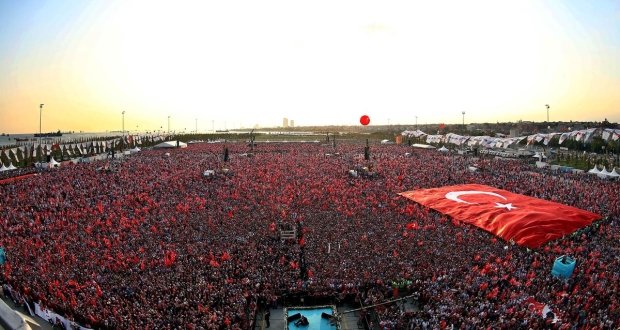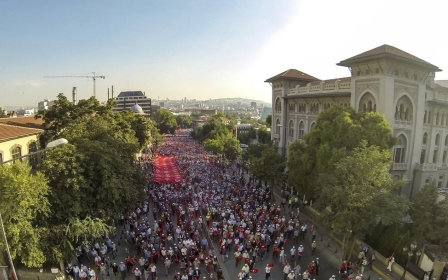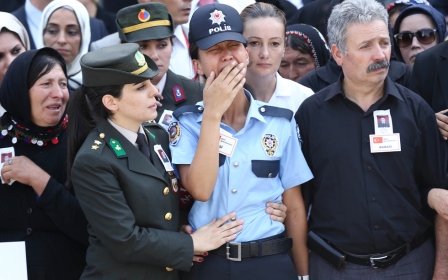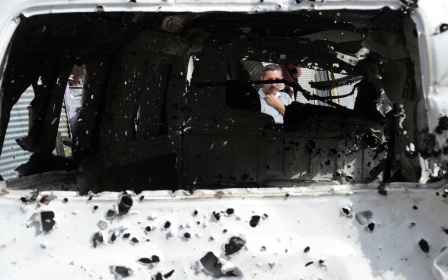Over 100,000 Turks gather at 'anti-terrorism' rally in Istanbul
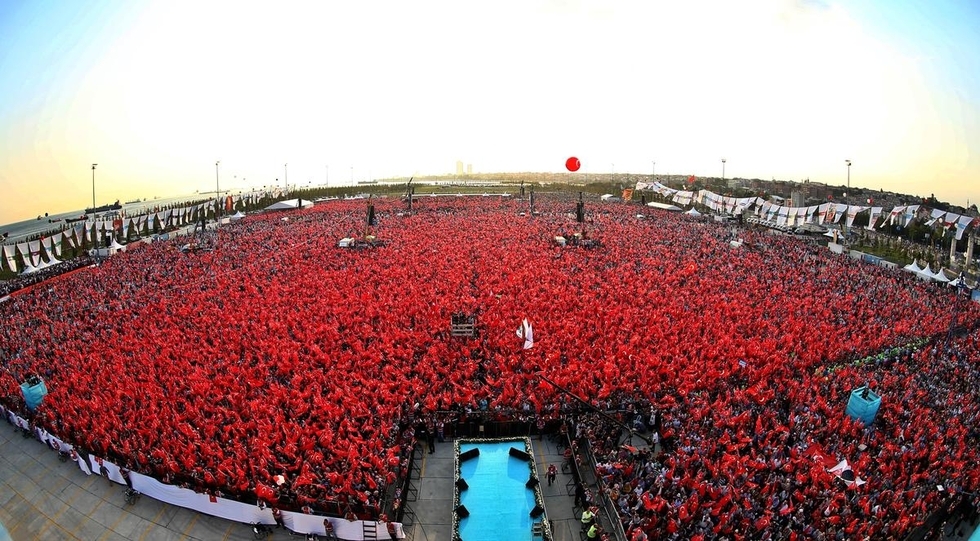
More than 100,000 people -- many waving Turkish flags -- attended an "anti-terrorism" rally in Istanbul on Sunday, AFP reporters estimated, as President Recep Tayyip Erdogan presses a major offensive against Kurdish militants.
The huge crowd thronged Yenikapi Square on the shores of the Marmara Sea for the demonstration.
On Thursday, thousands took part in a similar rally in the capital Ankara to denounce the Kurdistan Workers' Party (PKK), which has killed dozens of police and soldiers in a string of attacks in the southeast since the collapse of a two-year ceasefire in July.
Many of the demonstrators wore red headbands that eulogised the slain security force members as "martyrs".
"Martyrs never die, the homeland cannot be divided," the headbands read.
Erdogan's two-month-old offensive against the outlawed PKK - which is classified as terrorist group by Ankara, the EU, the US and other countries - comes as the country prepares for a 1 November general election.
His critics accuse him of reigniting a three-decade conflict with the PKK for electoral gain.
Kurdish rebels had stepped up attacks against the Turkish army and police after a suicide bombing in the southeastern Turkish town of Suruc killed 31 Kurdish activists.
The suicide bombing was blamed on Islamic State (IS) militants but the PKK blamed the government of being complicit in the attacks.
'Terrorists in parliament'
No political emblems were visible among the sea of red Turkish flags in Istanbul but many of the demonstrators expressed fervent support for Erdogan's Islamic-rooted Justice and Development Party (AKP).
"We will support Erdogan to the end. We are behind him because he defends our flag and our nation," Gunel Yildiz, a 43-year-old textile industry worker, who carried a giant Turkish flag, told AFP.
The AKP is looking to the upcoming election to reverse the losses it sustained in the last election in June, which stripped it of its governing majority, forcing it into coalition talks that ended in failure.
The big winner of that vote was the pro-Kurdish Peoples' Democratic Party (HDP) which took votes from the AKP to win seats in parliament for the first time.
"Believe me the terrorists won't return to parliament," Alev Akmurat, a 22-year-old student said. "The AKP will regain power, God willing," he added.
The government has accused the HDP of being a front for the PKK, allegations the party - which also enjoys support among non-Kurds - rejects.
But there has been widespread anger at the PKK’s offensive.
Over 120 soldiers and police have been killed in militant attacks since the escalation began, according to pro-government media.
The government for its part claims to have killed over a thousand Kurdish militants in airstrikes and ground operations in northern Iraq and southeast Turkey.
Over 40,000 people have been killed in the more than three decade of the PKK's insurgency.
PKK 'child soldiers'
Turkish security sources have told Anadolu Agency that the PKK has recruited around 2,000 children aged between 12 and 17 during the last two years, a figure that cannot be independently verified.
Security records say that many of those children were taken by force.
These figures have been compiled from families informing the Turkish authorities about the abductions.
Between 2013 and 2015, at least 410 children fled from the PKK and surrendered to Turkish security forces, according to the security records.
Testimony given to police intelligence also claims that PKK bribed children in southeastern provinces to make them attack Turkish forces.
Children said that they received an average of 100 Turkish liras ($33) to assault Turkish forces. If they were old enough, PKK militants handed over guns, children said, according to security forces.
International organisations have previously called on the PKK to end mobilising children for militant activity.
The United Nations Children’s Fund, or UNICEF, voiced its "profound concern" in 2010 that the PKK recruited child soldiers.
UNICEF said that such abuse was illegal and called on the PKK to halt the practice.
Also, a United Nations Human Rights Council report on Syria in 2013 said that anti-government and Kurdish armed groups had recruited and used child soldiers in hostilities.
New York-based Human Rights Watch said on 15 July that the People’s Protection Units (YPG), a Kurdish armed group in Syria, continued to mobilise children under 18 years of age for its fight, despite the fact that it pledged to demobilise all under 18 years.
German police see risk of PKK strikes on Turkish targets
Meanwhile, Berlin police have warned that there are risks of attacks by Kurdish militants against Turkish targets in Germany, according to an internal document seen by Welt am Sonntag newspaper.
The document classified "for use only by the service" said PKK militants could carry out "offences against state institutions including Turkey's consulate and embassy as well as cultural and commercial facilities in the form of media-attention attracting occupations, vandalism and arson".
In particular, vehicles bearing the Turkish diplomatic flags could be set on fire before Turkey's elections, warned the document quoted by the newspaper.
Major companies like airlines and banks could also be under threat of "occupations of radio and media offices, party offices".
A police spokeswoman declined comment on the report.
Turkey used air power and ground forces in a self-declared "anti-terror" operation launched in late July to try to cripple the Kurdish militant group in its strongholds in southeastern Turkey and northern Iraq.
Germany is home to a three-million-strong ethnic Turkish community, with many having immigrated in the 1960s and 1970s for employment.
Stay informed with MEE's newsletters
Sign up to get the latest alerts, insights and analysis, starting with Turkey Unpacked
Middle East Eye delivers independent and unrivalled coverage and analysis of the Middle East, North Africa and beyond. To learn more about republishing this content and the associated fees, please fill out this form. More about MEE can be found here.


